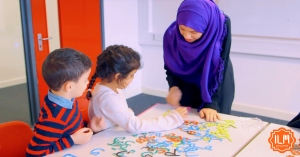We caught up with Zaynab Hamdi, who is currently crowdfunding her first product Letter Connector, an Arabic language teaching tool. She developed her product at Machines Room over the first year of her membership here. Help support the launch of the product here!
Can you tell us a bit about Letter Connector and where the idea came from?
The idea of Letter Connector came to me when I started teaching Arabic to children. I never enjoyed learning Arabic as a child, so I wanted to make sure that anyone I taught would not have the same experience. In Arabic there are 28 letters, and each letter has 4 different forms, which can make Arabic quite tricky. I wanted something that would provide a hands on learning experience, but I couldn’t find anything. After my search for resources, and realising that there wasn’t much around, I decided to make my own. That’s how I came up with the idea of doing Letter Connector, a fun interactive method that children could use to learn to read Arabic. Letter Connector is magnetic Arabic alphabet in all their different forms, with the vowels, and is strategically color coded to help visual learners.
Why did you chose Machines Room to prototype the product?
I stumbled across Machines Room by chance, and had no idea what to expect. I signed up for the Friday induction and then I joined. I did discover a maker space, close to where I lived, but most of the resources didn’t work and the people weren’t as cool and awesome as the ones at Machines Room. At Machines Room, I got support and guidance from the staff there and I made a lot of friends. It’s a really laid back chill environment.
Has being part of our community and volunteering with us helped you?
Definitely, Machines Room seems to attract really interesting people! I’ve made a lot of friends who have really helped me out when I have been clueless, or have had tight deadlines. I don’t have any background in product design, so anything I have learnt has come from google or the people that I have met at Machines Room. I have received an immense amount of support from the community at Machines Room, and I am so grateful for everyone there.
Did prototyping at Machines Room help when it came to finding manufacturers in China?
Prototyping did help me when I went to China, in that it helped me figure out which manufacturers I definitely would not go for. Because I already had learnt different methods of manufacturing, I was definitely much more informed when I went to China, and able to make better decisions about the factory I chose. Even though I did end up choosing a factory that I didn’t meet, Machines Room staff (especially Nat) were with me throughout the whole process, helping me to make the best decision.
What will you be working on next?

